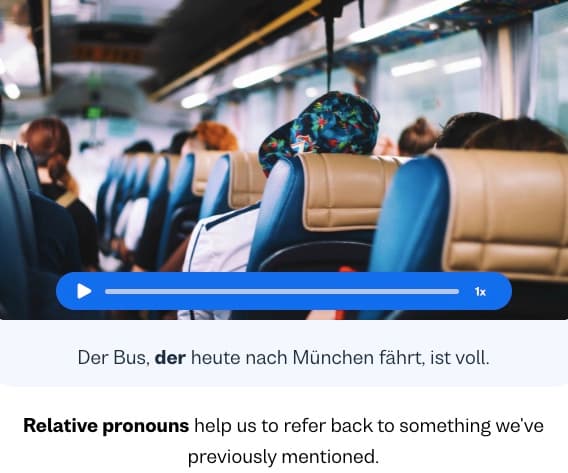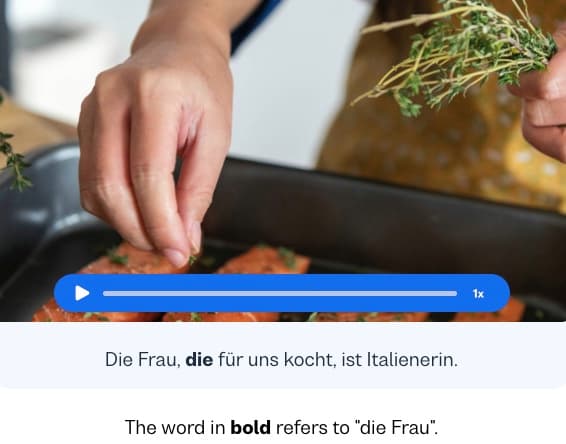I want to learn...
Relative pronouns are used to add more details or information to a person or a thing that we’ve already mentioned in a sentence. Doing so, they prevent us from repeating the same thing over and over again. They stand for“pro noun” (in place of a noun).
In English the most important relative pronouns are: which, that, who, whose and whom. You might use them a lot without thinking about it, saying sentences such as: “The app that I use for learning German is really great.”
Let’s see how we can add some information to the following simple German sentence:
Der Mann heißt Peter. (main clause) (The man is called Peter.)
If I want to specify the information on this guy or add something relevant, I can add a relative clause, opening with a relative pronoun:
Der Mann, der dort an der Ecke steht, heißt Peter. (The man (who is) standing there at the corner is called Peter.)
Other than in English, you cannot leave them out (see brackets above)!
You might have already noticed that the newly fitted information is a dependent clause which means that it cannot stand alone. It makes no sense without its main clause.
German relative pronouns can be challenging, because you can’t just use the same pronoun for each noun. You will have to look at our chart of relative pronouns and choose one according to the gender, number and case of the word(s) they refer to.
The good news is: If you have studied the German articles and their grammatical forms thoroughly, you already know a lot about relative pronouns!
Relative pronouns usage examples
Ich habe einen Onkel, der in Leipzig wohnt. (I have an uncle who lives in Leipzig.)
Das ist meine Freundin Inge, die ich schon seit 30 Jahren kenne. (This is my friend Inge who I have known for 30 years.)
Das ist das Auto, das ich kaufen will. (That is the car that I want to buy.)
Das sind die Kinder, die jeden Tag im Hof spielen. (These are the children who play in the yard every day.)
As you may have seen in these examples, the relative pronouns we use have to match the gender and number of the noun that they refer to:
Onkel is masculine, so the relative pronoun is der.
Inge is feminine, so the relative pronoun is die.
Auto is neuter, so the relative pronoun is das.
Kinder is plural, so the relative pronoun is also die.
Characteristics of relative pronouns
1. They change the word order
In dependent clauses, the word order changes in German. You might already have noticed that the word order in our examples is a bit different from what you’re used to: The relative pronoun comes first (or is sometimes preceded by a preposition), followed by the additional information with the changed verb at the very end – the infamous “frame” that the German language loves so much.
2. They change, as their needed case changes
The examples above are simple, as they represent the nominative (the basic case). But when it comes to any other grammatical case you may also need Genitiv (genitive) Dativ (dative) or Akkusativ (accusative) case. It depends on the function that the respective relative pronoun takes on.
Let’s look at a few examples:
Nominativ
Das ist mein Kumpel, der den ganzen Kuchen gegessen hat.(This is my buddy who ate the whole cake.)
Here, the word Kumpel (male) is used as the subject of the relative clause, which is why the relative pronoun has to be in the nominative.
Akkusativ
Das sind die Kinder, die ich manchmal im Hof spielen sehe.(These are the children that I sometimes see playing in the yard.)
Here, the word Kinder is used as the direct object of the relative clause, which is why the relative pronoun has to be in accusative.
Dativ
Das ist das Teammitglied, dem wir das Geschenk gekauft haben.(This is the team member for whom we bought the gift.)
Here, the word Teammitglied (neuter) is used as the indirect object of the relative clause, which is why the relative pronoun has to be in dative.
Genitiv
Das ist die Dame, deren Auto ich kaufen werde.(This is the lady whose car I am going to buy.)
Here, the word Dame (female) possesses the subject of the relative clause, which is why the relative pronoun has to be in genitive.
And here is a table below with all the possible relative pronouns for all grammatical genders and all cases:
Chart of German relative pronouns
| Cases | Masculine | Feminine | Neuter | Plural |
|---|---|---|---|---|
| Nominative | der | die | das | die |
| Accusative | den | die | das | die |
| Dative | dem | der | dem | denen |
| Genitive | dessen | deren | dessen | deren |
3. They need commas
Relative clauses are separated from the main sentence with a comma. In spoken German, you might notice a little gap in the speech that marks the place where a comma must be. Do not worry too much about these commas. Lots of Germans have trouble knowing where to put a comma, as well.
Special tips and features
Although used in a vast variety in everyday life, even for native German speakers, the relative pronouns can be challenging. In some German dialects, speakers make their life much easier by using “wo” (where) instead of “der”, “die”, “das” etc. This happens only in some regions and in spoken language only. It is NOT considered to be acceptable correct German, though.
Instead of “ der”, “die”, “das “, etc. you can use the relative pronouns “welcher”, “welche”, welches”. But as they are much longer and need the same grammatical attention as the shorter pronouns (that look like articles), they are rarely used. Welcher, welche, welches and their respective forms are mostly reserved for writing.
When starting to learn German you will quickly come across the German articles der, die, das, die. In case you need one more reason to deal with them right away: Knowing your articles means basically also knowing a lot about your relative pronouns. So, you can cross two hurdles with one leap!
And one last tip: Rather use the wrong relative pronoun than leaving it out completely (as you might try in English). The wrong one will be forgiven; the latter will destroy the meaning of your sentence completely.
Newlanguages


